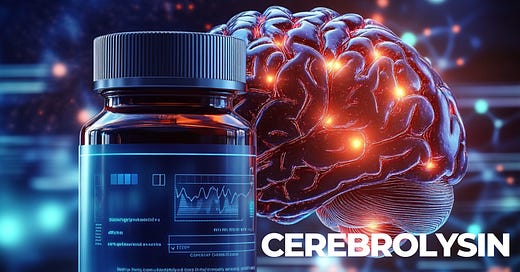Brain boosters—substances known to enhance mental performance—are in growing demand in the pursuit of cognitive enhancement and neuroprotection. Among these, Cerebrolysin, a peptide-based nootropic, is notable for its potential to sharpen mental clarity, enhance memory, and protect the brain from damage. Positioned uniquely within the nootropic category, this drug holds promise for a spectrum of conditions, from mild cognitive impairment to more serious neurodegenerative diseases like Alzheimer's and Parkinson's.
>>>>Click here to buy Cerebrolysin <<<<<
What is Cerebrolysin?
Cerebrolysin is a distinctive brain-boosting compound, made from a peptide mixture derived from pig brain, specifically formulated to regulate neuron function and neuronal networks. It offers a complex approach to supporting brain health, using neurotrophic peptides and essential amino acids to promote neuroprotection and cognitive enhancement.
Mechanism of Action
Cerebrolysin works by emulating the body’s natural neurotrophic factors, creating a broad range of effects on the brain. These include stimulating neurogenesis, supporting cell differentiation, and enhancing nerve cell performance, which may positively impact cognitive functions, memory, and learning. This versatility positions Cerebrolysin as a strong candidate for addressing cognitive deficits.
Research Background
Numerous placebo-controlled clinical studies have investigated Cerebrolysin’s effectiveness in addressing cognitive impairment. Findings suggest that Cerebrolysin can significantly improve outcomes, especially in patients with acute neurological conditions such as traumatic brain injury (TBI) and ischemic stroke, compared to placebo. These studies highlight the drug’s potential as a neuroprotective and cognitive-enhancing agent.
Benefits of Using Cerebrolysin
Memory and Learning
Cerebrolysin has shown considerable potential as a memory enhancer, aiding memory retention and learning. This is particularly valuable for patients with conditions such as Alzheimer's disease and vascular dementia, where cognitive decline is prominent. Its neuroprotective properties support cognitive stability and improvement, often showing marked benefits over placebo.
Cognitive Function and Mood
Cerebrolysin boosts overall cognitive performance, which is essential for addressing deficits associated with neurodegenerative and vascular-related diseases. Additionally, it offers mood-stabilizing effects, making it especially helpful for patients who experience mood fluctuations alongside cognitive impairment.
Combatting Neurodegenerative Diseases
Cerebrolysin’s neuroprotective qualities are fundamental in managing diseases like Alzheimer's and Parkinson's. By supporting neuron health and promoting neurogenesis, it plays a key role in neurorehabilitation, helping to protect against brain damage and slow the progression of neurodegenerative disorders.
How to Use Cerebrolysin
Dosage and Administration
The recommended dosage of Cerebrolysin varies based on the specific condition being addressed, with options ranging from intramuscular injections to intravenous (IV) therapy. Dosing and administration are tailored to individual needs, highlighting the necessity of professional medical guidance for safe and effective use.
Potential Side Effects and Safety
Clinical studies, including double-blind, placebo-controlled trials, have shown that Cerebrolysin is generally well-tolerated with minimal significant side effects. However, as with any treatment, individual responses may differ, so monitoring for any adverse reactions is essential.
Considerations and Contraindications
Cerebrolysin may not be suitable for everyone, particularly those with specific allergies or certain medical conditions. A comprehensive medical evaluation is essential to ensure it is a safe option, especially for individuals with a history of stroke, traumatic brain injury (TBI), or neurodegenerative diseases.
Final Thoughts
Cerebrolysin stands out as a promising advancement in cognitive-enhancing therapies. It provides a well-supported option for improving memory, boosting cognitive function, and offering neuroprotection against degenerative diseases. As research and clinical trials progress, it’s potential continues to expand, fostering hope for patients facing cognitive challenges and contributing to a future with enhanced support for brain health.




